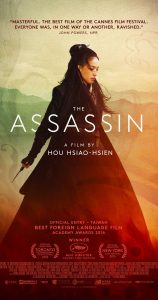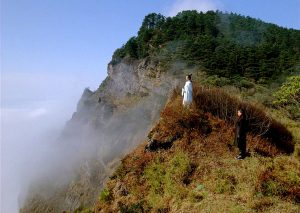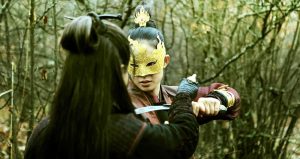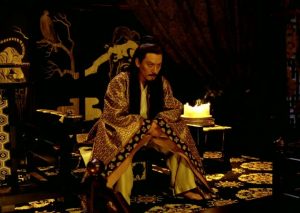
“The Assassin” is one of the most gorgeous films I’ve seen in years! The cinematography by Mark Lee Ping Bin is nothing short of phenomenal, capturing the picaresque landscapes of eighth century China. Lee breathes life into the film, with the innocence and beauty of nature perfectly contrasting the lifeless society the corrupt government has created. Even more amazing is that the film was shot in 4:3, an aspect ratio that is most common in pan and scan transfers. It boxes the film in, which would seem like a crime for such a lavishly shot film. On the contrary, Lee uses it to his advantage, showing the world as restrained. The government has sheltered in society, causing the world as a whole to feel cramped. On rare occasions the film is presented in 1.85:1, with those moments being the few tender moments in the film (such as a woman wonderfully playing a lovely melody in the sunlight). It is those moments that act as glimmering hopes in this world.
Hou Hsiao-hsien knows what he’s doing. He’s not employing the extinct 4:3 aspect ratio as a gimmick to drum up interest in the film. He’s using it to tell his story, using Lee’s cinematography in his direction. Most of the story is told via the cinematography, with very little dialogue being spoken. That which is spoken is rather mundane, acting as exposition to help further the plot.

This is where “The Assassin” hits a wall. While its ambitious direction is applaudable, its simplistic story is troubling. The screenplay, amazingly credited to four people (Zhong Acheng, Chue T’ien-wen, Hsieh Hai-Meng, and the director), is too one-note, invoking familiar tropes to carry the heavy lifting. The film is based on a short story by Pei Xing and it shows. I can see where Pei’s focus was on just by watching this film, that being the assassin’s mission to slay the corrupt government. The government’s effect on society was probably kept at a minimum as a way of commentating on the hollowness of their existence. This works in a short story, but not in a stretched-out feature length film. The usage of cinematography to highlight and navigate the viewer through this commentary is clever, but not fully realized.
The assassin is Nie Yinniang (Shu Qi), trained her entire life by Jiaxin (Fang-Yi Sheu) to overthrow the government. And that’s basically it. There’s subtle hints to Yinniang being devoid of life, as she’s essentially been programmed to kill and kill only. However, these moments are fleeting, with Hou relying too heavily on the cinematography to showcase them. The same goes for the politics of the government, though those are a bit more realized in the cinematography. Even so, the politics fall flat. While one understands the ramifications beset upon the land by the government, one never truly feels their impact. We see it, but don’t feel it.

Additional dialogue isn’t the solution to the film’s problem. Dialogue being pushed aside for the story to be told via cinematography and body language can work, as proven by the likes of Terence Malick and Stanley Kubrick. Those elements must be supported by an engaging story and confident direction, which isn’t on display here. The cinematographer himself seems to have a better grasp on how to use visuals and human emotion to convey symbolism than the director does.
I really wanted to like “The Assassin.” I loved the approach and found it to be an intoxicating watch visually! Yet, I couldn’t get past the emptiness of it all. Not an emptiness that felt powerfully symbolic, but one that felt uncertain. Many films have tackled the corrupt government angle and done it much better. Just as well, many films have showcased martial arts battles like the ones in this film and done it much better. The only thing those films haven’t done as well as this one is their cinematography.

I have no doubt that Hou Hsiao-hsien’s approach can work; it has in the past and most likely will in the future. It just didn’t work with “The Assassin.”
Final Rating: C+
